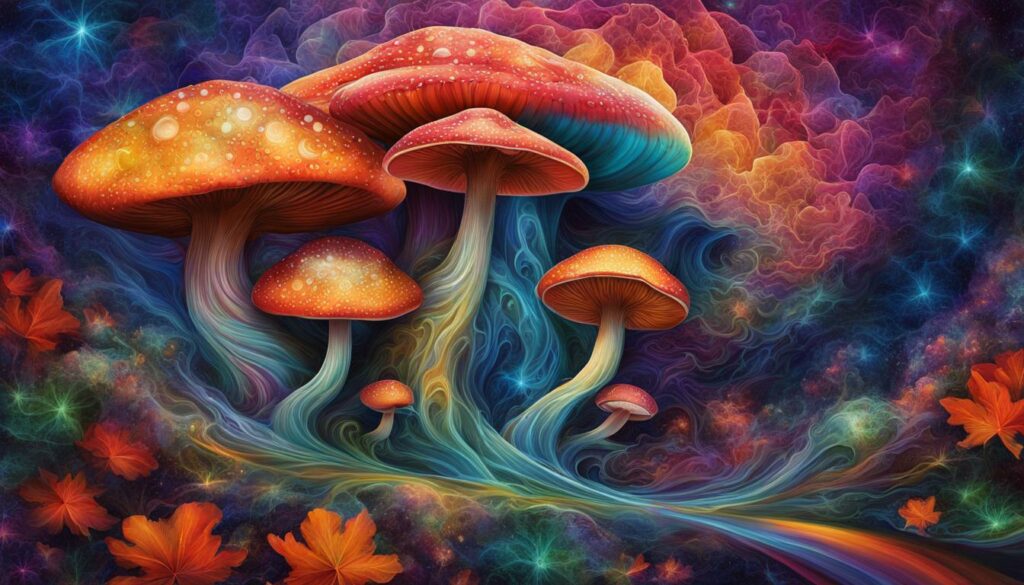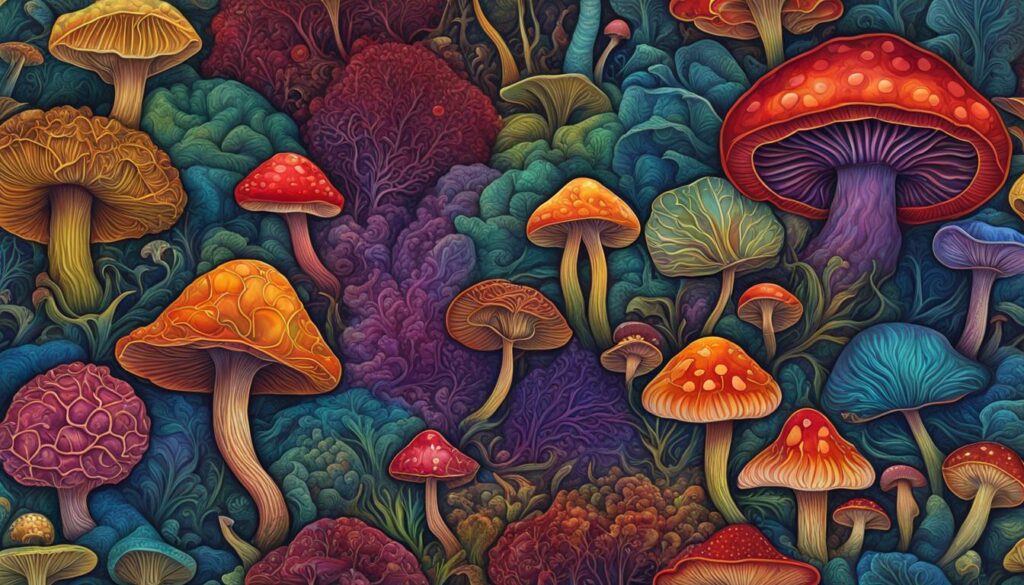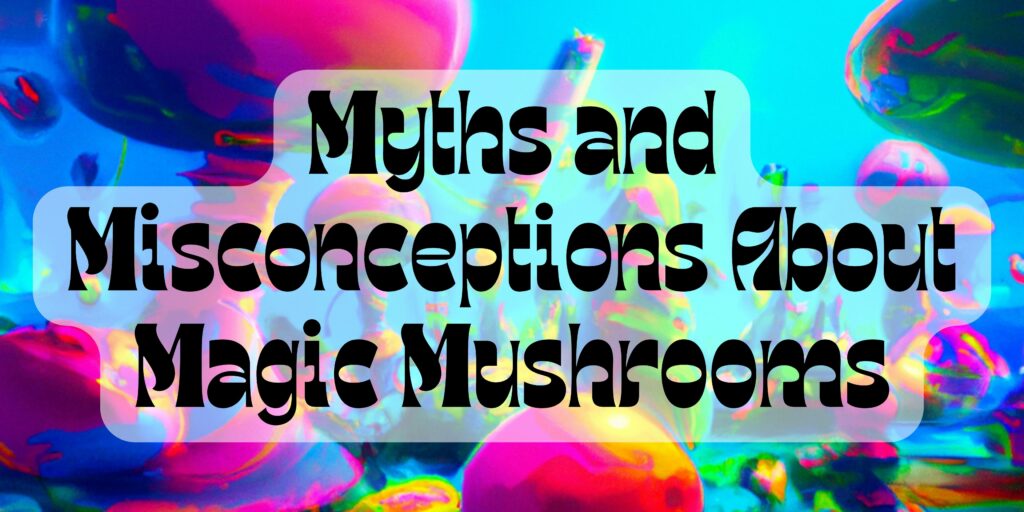Research suggests that psilocybin, the active ingredient in magic mushrooms, has a profound effect on the brain. Studies have shown that psilocybin activates specific serotonin receptors in the brain and modulates neural signaling pathways. It has been found to alter brain activity, leading to changes in mood, perception, and cognition. The psychedelic effects of shrooms are believed to be mediated by the activation of 5-HT2A receptors in the prefrontal cortex, amygdala, and other areas of the brain. Psilocybin has also been found to increase neural plasticity and enhance functional connectivity within the brain.
Key Takeaways:
- Psilocybin, the active ingredient in magic mushrooms, has a profound effect on the brain.
- It activates specific serotonin receptors and modulates neural signaling pathways.
- The psychedelic effects of shrooms are believed to be mediated by the activation of 5-HT2A receptors.
- Psilocybin increases neural plasticity and enhances functional connectivity within the brain.
- Further research is needed to fully understand the mechanisms and therapeutic applications of shrooms on the brain.
Neurological Effects of Shrooms
Shrooms, also known as magic mushrooms, have been found to have a range of neurological effects. When consumed, psilocybin, the active ingredient in shrooms, stimulates the release of neurotransmitters like serotonin, dopamine, and glutamate, which play a crucial role in brain function.
Studies have shown that psilocybin can increase cortical excitability and promote synchronized gamma oscillations, which are associated with cognition, learning, and memory. This may explain the heightened sense of perception and introspection often experienced during a shroom trip.
Shrooms also affect brain chemistry by modulating the activity of various receptors, including the serotonin 5-HT2A receptor, which is involved in mood regulation and emotional processing. Through these interactions, shrooms can alter brain activity, leading to changes in mood, perception, and cognition.
| Neurological Effects of Shrooms | Description |
|---|---|
| Increase cortical excitability | Shrooms have been found to increase cortical excitability, which is associated with cognition, learning, and memory. |
| Modulate activity of serotonin receptors | Shrooms interact with serotonin receptors in the brain, which can affect mood regulation and emotional processing. |
| Promote synchronized gamma oscillations | Synchronized gamma oscillations are associated with heightened perception and introspection, which are often experienced during a shroom trip. |
These neurological effects contribute to the cognitive impact of shrooms, including altered perception, enhanced creativity, and increased openness to new experiences. However, it is important to note that the cognitive impact of shrooms can vary depending on the individual and the dosage.
Shrooms and Cognitive Function: An Overview
Magic mushrooms, also known as shrooms, have been found to have a significant impact on cognitive function. Research suggests that the active ingredient in shrooms, psilocybin, can enhance certain aspects of cognition and promote new insights and perspectives.
A study conducted by the Johns Hopkins University School of Medicine found that psilocybin administration led to increases in openness to new experiences and creativity. Participants reported experiencing enhanced problem-solving abilities and heightened creativity following a shroom trip. These findings suggest that shrooms may have the potential to enhance cognitive flexibility and promote innovative thinking.
“The shroom experience opened my mind to new ideas and possibilities. It allowed me to think outside the box and come up with creative solutions to problems,” said one participant in the study.
In addition to enhancing cognitive function, shrooms have also shown promise in therapeutic settings. Research has demonstrated their potential in the treatment of various psychiatric disorders, such as depression, anxiety, and addiction. Psilocybin-assisted therapy has been found to help patients gain new perspectives on their lives and overcome mental health challenges.
While the cognitive impact of shrooms appears to be positive for many individuals, it is important to note that the effects can vary depending on dosage and individual factors. Further research is needed to fully understand the mechanisms underlying the cognitive effects of shrooms and to determine the appropriate use and dosage for therapeutic applications.
Table: Cognitive Effects of Shrooms
| Cognitive Function | Effect |
|---|---|
| Creativity | Enhanced problem-solving abilities and increased openness to new experiences. |
| Insight | Promotion of new insights and perspectives. |
| Therapeutic Potential | Potential for the treatment of depression, anxiety, and addiction. |
It is important to approach the use of shrooms with caution and under professional guidance, especially in therapeutic contexts. While they may hold promise for enhancing cognitive function and promoting well-being, responsible and informed use is crucial to ensure a safe and beneficial experience.
Psychological Effects of Shrooms
The psychological effects of shrooms, also known as hallucinogenic mushrooms, can be profound and transformative. Users often report intense introspection, enhanced emotions, and heightened sensory perception while under the influence of psilocybin, the active compound in shrooms. These effects are thought to be mediated by the interaction of psilocybin with serotonin receptors in the brain, as well as changes in neural networks and connectivity.
“I experienced a profound sense of unity and connection with everything around me. It was as if I could see the underlying interconnectedness of all things,” said a participant in a research study on the psychological effects of shrooms.
Shrooms have been associated with improved mood, decreased anxiety and depression symptoms, and increased well-being. The mystical or spiritual experiences often reported by users can lead to a greater sense of purpose and meaning in life. However, it is important to note that the psychological effects of shrooms can vary widely depending on individual factors such as mindset, dosage, and setting.
Table: Reported Psychological Effects of Shrooms
| Effect | Description |
|---|---|
| Intense introspection | Users often experience deep self-reflection and contemplation, gaining new insights into their thoughts and emotions. |
| Enhanced emotions | Emotions can be intensified, leading to a greater capacity for empathy, compassion, and love. |
| Heightened sensory perception | Colors, sounds, and textures may appear more vibrant and vivid, enhancing the overall sensory experience. |
| Mystical or spiritual experiences | Users may report a profound sense of connection with nature, the universe, or a higher power. |
It is worth noting that while the psychological effects of shrooms can be therapeutic for some individuals, they can also be challenging and potentially induce anxiety or discomfort. Therefore, it is crucial to approach the use of shrooms with caution, in a safe and supportive environment.

Psilocybin and Brain Activity
Psilocybin has been found to significantly alter brain activity and connectivity, providing insights into the profound effects of magic mushrooms on the brain. Functional magnetic resonance imaging (fMRI) studies have revealed changes in blood flow and neural activity in regions such as the prefrontal cortex, default mode network, and visual cortex during a shroom trip.
One study conducted by Carhart-Harris et al. (2014) observed decreased activity in the default mode network and increased connectivity between various brain regions after administration of psilocybin. The default mode network is associated with self-reflection and mind-wandering, and its decrease in activity during a shroom trip is believed to be linked to the “ego-dissolution” experience reported by many users.
Another study by Müller et al. (2017) found that psilocybin modulates brain activity by altering the balance between excitatory and inhibitory neurotransmitters. This modulation leads to increased global connectivity, particularly in brain regions involved in visual processing, emotion regulation, and introspection.
| Brain Region | Effects of Psilocybin |
|---|---|
| Prefrontal Cortex | Altered sense of self, enhanced emotions |
| Default Mode Network | Decreased activity, ego-dissolution |
| Visual Cortex | Increased visual processing, visual hallucinations |
The changes in brain activity induced by psilocybin are thought to underlie the altered states of consciousness and profound subjective experiences reported by users. These findings contribute to our understanding of how magic mushrooms affect the brain and provide valuable insights into the therapeutic potential of psilocybin for treating various psychiatric disorders.
Shrooms and Neural Plasticity
Emerging research suggests that shrooms may have a fascinating impact on neural plasticity, the brain’s remarkable ability to adapt and reorganize itself. Studies have shown that psilocybin, the active psychedelic compound in magic mushrooms, can promote the formation of new brain cells, a process known as neurogenesis. Specifically, psilocybin has been found to enhance neurogenesis in the hippocampus, a region of the brain involved in learning and memory. This suggests that shrooms have the potential to positively influence cognitive function and mental health.
Furthermore, psilocybin has been shown to increase synaptic plasticity and dendritic spine density in cortical neurons. Synaptic plasticity refers to the brain’s ability to strengthen or weaken connections between neurons, which is crucial for learning and memory formation. The increase in dendritic spine density, small protrusions on neurons that receive incoming signals, indicates enhanced neuronal communication and the potential for improved brain function.
Overall, the findings suggest that shrooms have the capacity to reshape the brain’s structure and function through their influence on neural plasticity. These changes in the brain may contribute to the long-lasting effects of shrooms on mood, cognition, and mental health. However, further research is needed to fully understand the mechanisms underlying these effects and explore their potential therapeutic applications for various psychiatric disorders.

Conclusion
Shrooms have a profound effect on the brain, influencing brain activity, neurotransmitter levels, and neural connectivity. The cognitive and psychological effects of shrooms can be transformative and therapeutic, offering new insights, enhancing mood, and supporting psychological well-being.
It is crucial to approach shrooms responsibly and seek guidance from trained professionals in therapeutic settings. Further research is required to fully comprehend the mechanisms underlying the impact of shrooms on the brain and to explore their potential therapeutic applications for various psychiatric disorders.
In conclusion, the shrooms effect on the brain is a fascinating area of study. By understanding the neurological and cognitive impacts of shrooms, we can gain valuable insights into brain function and potentially unlock new avenues for human well-being.
FAQ
How do shrooms affect the brain?
Shrooms, containing psilocybin, activate specific serotonin receptors in the brain, leading to changes in mood, perception, and cognition. They also increase neural plasticity and enhance functional connectivity within the brain.
What neurological effects do shrooms have?
Shrooms stimulate the release of neurotransmitters like serotonin, dopamine, and glutamate, and increase cortical excitability and promote synchronized gamma oscillations. They also modulate the activity of various receptors, including the serotonin 5-HT2A receptor.
How do shrooms impact cognition?
Shrooms can enhance creative thinking, increase openness to new experiences, and promote a sense of interconnectedness. They temporarily disrupt cognitive processes like working memory and attention, while facilitating the emergence of new insights and perspectives.
What psychological effects are associated with shrooms?
Shrooms induce altered states of consciousness characterized by intense introspection, enhanced emotions, and heightened sensory perception. Users often report mystical or spiritual experiences, improved mood, decreased anxiety and depression symptoms, and increased well-being.
How does psilocybin alter brain activity?
Psilocybin decreases activity in the default mode network, associated with self-reflection and mind-wandering, while increasing connectivity between various brain regions, leading to altered states of consciousness and profound subjective experiences.
Can shrooms enhance neural plasticity?
Emerging research suggests that shrooms may enhance neural plasticity by promoting neurogenesis, increasing synaptic plasticity, and dendritic spine density in cortical neurons. These structural changes in the brain can have long-lasting effects on mood, cognition, and mental health.
Are shrooms safe to use?
Shrooms should be used responsibly and under the guidance of trained professionals, particularly in therapeutic settings. Further research is needed to fully understand the effects of shrooms on the brain and their potential therapeutic applications.




